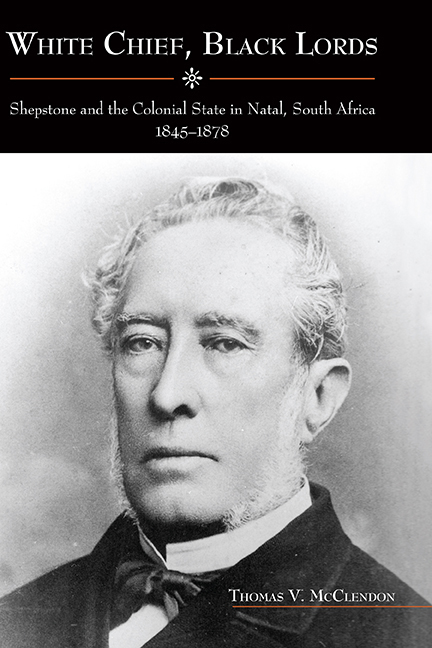Book contents
- Frontmatter
- Dedication
- Contents
- List of Illustrations
- Acknowledgments
- List of Abbreviations
- 1 Introduction
- 2 The Man Who Would Be Inkosi
- 3 Witchcraft and Statecraft
- 4 You Are What You Eat Up
- 5 Guns, Rain, and Law
- 6 From Show Trial to Shallow Reform
- 7 Conclusion
- Notes
- Glossary
- Bibliography
- Index
- Rochester Studies in African History and the Diaspora
6 - From Show Trial to Shallow Reform
Published online by Cambridge University Press: 09 May 2017
- Frontmatter
- Dedication
- Contents
- List of Illustrations
- Acknowledgments
- List of Abbreviations
- 1 Introduction
- 2 The Man Who Would Be Inkosi
- 3 Witchcraft and Statecraft
- 4 You Are What You Eat Up
- 5 Guns, Rain, and Law
- 6 From Show Trial to Shallow Reform
- 7 Conclusion
- Notes
- Glossary
- Bibliography
- Index
- Rochester Studies in African History and the Diaspora
Summary
The natives … of Natal, have to be ruled by a mixture of English law and Zulu customs, which mixture, I have frequently been told, exists in its entirety only in the bosom of one living man.
Anthony Trollope, South AfricaThe trial of Langalibalele was on one level simply a venal exercise in colonial oppression, designed to secure the conviction and severe punishment of the “rebellious” Hlubi inkosi at any cost. It was a circus that made a mockery of any colonial claims to securing justice for the people of Natal in the name of a civilizing mission. The improvised nature of this farce, however, has left a record that exposes the irresolvable contradictions at the heart of indirect rule. The colonial authorities claimed to have conducted the trial according to “Native Law,” while in fact avoiding commitment to any particular legal standard. In the process, their actions and statements displayed not only a callous indifference to justice but considerable confusion about the justification for their own claim to authority in the colony. The trial itself, followed by Bishop Colenso's work to rectify the injustices through an appellate process, exposed the dangers of SNA Theophilus Shepstone's autocratic methods to a wider imperial audience. Although Shepstone himself retained his office and ultimately gained a knighthood, the scandal of the precipitate colonial action against the Hlubi and the farcical trial of their inkosi helped to stimulate legislative reforms that sought to bureaucratize and divide the SNA's powers, to codify native law, and finally to reduce the amakhosi to salaried chiefs who owed their authority and allegiance to the colonial state.
Inkosi Langalibalele, of course, had been declared guilty long before the trial even began. After Mahoyiza returned from his encounter with the inkosi with his tale of being “stripped,” SNA Shepstone proclaimed that as Langalibalele and his people had “disobeyed the orders of the Supreme Chief and defied the authority” of the queen's government, and “insulted the messengers sent by the Supreme Chief” (that is, the lieutenant governor), force would be used to “coerce and reduce to obedience said rebellious Chief and Tribe” if they did not surrender within twenty-four hours.
- Type
- Chapter
- Information
- White Chief, Black LordsShepstone and the Colonial State in Natal, South Africa, 1845–1878, pp. 108 - 124Publisher: Boydell & BrewerPrint publication year: 2010

